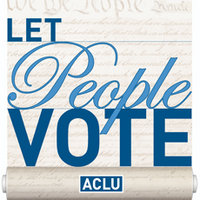In Florida, Voter Registration Laws Impede The Latino Vote

 By Howard L. Simon and Deborah J. Vagins, ACLU
By Howard L. Simon and Deborah J. Vagins, ACLU
With Florida’s primary recently completed, all eyes have been on the Sunshine State. And in an effort to shine a light on the state’s new regressive voting laws, the Senate Judiciary Subcommittee on the Constitution, Civil Rights and Human Rights, chaired by Sen. Dick Durbin, recently held a federal field hearing in Tampa, Florida.
Florida is just one of many states now enacting discriminatory laws that block Americans from the ballot box. All these laws aim to do one thing: make it harder for people to vote. And who do these laws disproportionately impact? African-Americans, the elderly, people with disabilities, students, low-income and language minority voters.
The state’s new law now makes it nearly impossible for individuals like Belinthia Berry and organizations like the non-partisan League of Women Voters to register voters. For years, Belinthia has registered voters in East Tampa, a predominantly lower-income African-American neighborhood. But now, under Florida’s new law, Belinthia could face major fines if they fail to meet the new burdensome requirements.
Belintha says, “The problem with the new voter registration law in Florida is that the penalties that they impose for the smallest minute errors that previously weren’t there just make it very cumbersome for any non-profit, third party to want to go out and register voters.” These restrictions will no doubt have crippling effects on voter participation in this year’s election and have already led groups like the venerable League of Women Voters to pull out of all voter registration efforts in Florida.
The new restrictions on third-party voter registration come packaged as part of a larger elections bill (HB 1355) that contains 80 changes to the state’s election laws. Other provisions include reducing the number of early voting days from 14 to eight; prohibiting early voting on Sunday before an election; and only allowing voters who have moved from one county to another and need to update their address at the polling place to cast a provisional ballot, which may not even be counted.
In another setback to American’s most fundamental right, Florida authorities recently toughened the state’s rules around the restoration of rights, disfranchising nearly one million Florida citizens with past criminal convictions for life. These individuals — who account for nearly one in five disfranchised citizens in the country — are now only able to recover their right to vote through a difficult and burdensome clemency process which has resulted in very few grants of restoration.
We cannot afford to have laws that push people out of the electorate; every eligible American must be able to vote in order for this to be a true democracy. Our video below features interviews with Yvette Lewis of the NAACP, Christopher Cano of the Hillsborough County Democratic Hispanic Caucus and Belinthia Berry of the National Coalition of 100 Black Women. They discuss how this new law will suppress voter turnout in African-American and Latino communities.
[Video By acluvideos; ]

